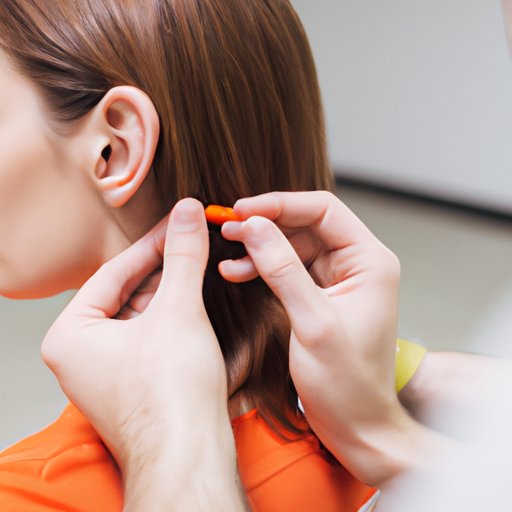
Introduction
Have you ever flown on a plane or been in an elevator and felt pressure in your ears? That discomfort is due to the change in air pressure, which can cause your ears to feel full or “clogged.” Luckily, there are several techniques to relieve that pressure and get your ear to pop.
It’s important to know how to get your ear to pop because it can prevent more serious problems like temporary hearing loss or even ruptured eardrums. But first, let’s understand the anatomy of the ear.
Yawning and Swallowing
Yawning and swallowing are the easiest ways to get your ear to pop. Both cause the muscles in your ears to contract, which can help equalize pressure and relieve discomfort.
If you need to encourage yawning, there are a few things you can try. Watching someone else yawn or thinking about yawning can sometimes trigger the reflex. Additionally, trying to take deep breaths or relaxing your muscles can help.
Swallowing can be encouraged by sipping water, chewing gum, or eating. These actions stimulate the muscles needed to swallow, and the act of swallowing can help equalize pressure in your ears.
The Valsalva Maneuver
If yawning and swallowing don’t work, the Valsalva maneuver is the next technique to try. This involves pinching your nose shut while gently blowing out. The air you blow out should be gentle, like trying to blow up a balloon. This helps equalize the pressure in your ears.
It’s important to perform the Valsalva maneuver correctly to avoid any negative effects. Begin by taking a deep breath and pinching your nose shut. Then, gently blow out while keeping your mouth closed. You should feel a release of pressure in your ears.
It’s important to note that the Valsalva maneuver should not be performed if you have a sinus infection, as it can worsen symptoms. Additionally, if you experience pain during the maneuver, stop immediately and try a different technique.
The Toynbee Maneuver
The Toynbee maneuver is another technique to try if yawning and swallowing don’t work. This involves swallowing while holding your nose shut. The act of swallowing helps equalize pressure, while holding your nose shut helps to direct the air towards your ears.
To perform the Toynbee maneuver correctly, pinch your nose shut and take a sip of water. Then, swallow the water while keeping your nose pinched shut. You should feel a release of pressure in your ears.
Over-The-Counter Medications
If the above techniques don’t work, there are over-the-counter medications that can help. These medications work by reducing inflammation or drying up excess fluid in the ear.
Common medications for ear popping include decongestants like Sudafed, antihistamines like Claritin, and ear drops like Debrox. Be sure to read the instructions carefully and follow them closely to avoid any negative effects.
When to See a Doctor
If none of the above techniques or OTC medications work, it may be time to see a doctor. Symptoms like severe pain, fever, or discharge could indicate a more serious underlying issue like an ear infection or ruptured eardrum.
You can find a doctor or specialist by asking for recommendations from friends or family, consulting your primary care physician, or looking online for specialists in your area. A doctor can help diagnose and treat any underlying conditions causing your ear popping.
Conclusion
Getting your ear to pop may seem like a small issue, but it can cause discomfort and even lead to more serious problems. Luckily, there are several techniques to relieve pressure and equalize your ears. From yawning and swallowing to the Valsalva and Toynbee maneuvers, there’s a technique that can work for you. If all else fails, over-the-counter medications and seeing a doctor are other options to explore. Remember, it’s important to take care of your ears and seek help if needed.





